Now that we’re into October and cooler weather is fast approaching, we’re preparing a few posts that we hope will be helpful to RV owners who continue to travel in winter and those who prefer to prepare their RVs for a safe winter passage in storage. So today, we’re starting off with our favorite tips for winter RV camping… to help you enjoy your RV, even in cold weather. ????????
- 1) How Do I Prepare for Winter RV Camping?
-
2)
How Do I Keep My RV Warm in the Winter?
- 2.1) Add a Lightbulb to Your Water Compartment
- 2.2) Turn on Your Basement Heater Blower Fan During Winter RV Camping
- 2.3) Tap Into an External Propane Source
- 2.4) Add Portable Heat Sources to Your RV’s Living Area
- 2.5) Use Holding Tank Heat Pads
- 2.6) Use Warm Linens and a Bed Warmer on your Winter RV Camping Trip
- 3) How Do I Keep Moisture Out of My RV During Winter Camping?
- 4) Conclusion
How Do I Prepare for Winter RV Camping?
Because we hate the cold we’re snowbirds, we typically chase warm winter weather, but in our 18 years as full-time RVers, we’ve spent our fair share of time in cold winter climates. So, we’re well prepared for the unique issues cold winters can present for RVers. Here are a few things you can do to be prepared to navigate and enjoy some winter RV camping.
Keep Your Water Hose from Freezing
If you’re connected to a city water source during the time you spend winter RV camping, and the weather’s cold enough, you’ll want to insulate your water hose sufficiently to keep the line from freezing. There are some great heated RV water hoses on the market (and we’ll be doing a post soon about our favorite ones), but when we first did some winter RV camping in freezing weather, we made our own heated water hose.
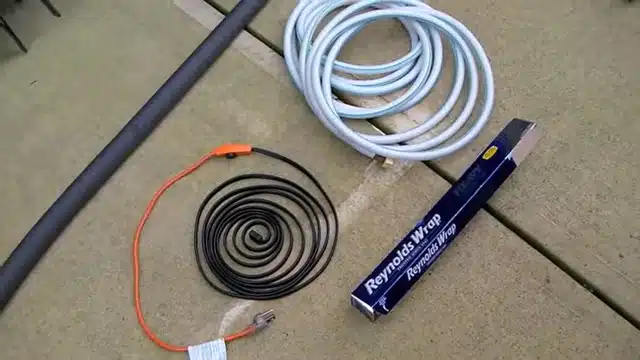
With just a few items, you can make your own heated water hose for winter RV camping.
This is a project that you can take on yourself if you wish. The process is simple and requires only a few items:
- A drinking-water-safe hose
- Heavy-duty aluminum foil (we used Reynolds Wrap)
- Heat Tape (the length of your water hose plus an extra foot or so)
- Split Foam Tube (the length of your water hose plus a couple of feet, and be sure the diameter of the inner opening is large enough to go around the outside of your freshwater hose AND the heat tape)
And the basic directions are (for more detail, read/watch: How To Make Your Own Heated RV Water Hose):
- Wrap the entire length of your water hose with aluminum foil
- Put the foil-wrapped hose inside the split foam tube
- Run the heat tape inside the foam tube all along the whole length of the hose
- Seal the foam tube with the included tape or with duct tape
Heat tape is available in various lengths, so you’ll need to determine the length you need in advance of purchasing:
- Manufactured in china
- Easy to use
Keep Your Gray Water from Freezing During Winter RV Camping Trips
The trick to keep your gray water flowing is to ensure that your sewer hose is on a bit of a downhill slant.
If your sewer hose is lying on the ground and then going up into the sewer connection, you’ll find yourself with a frozen sewer line. Anywhere water can pool up, it can freeze into a plug, blocking your hose from draining.
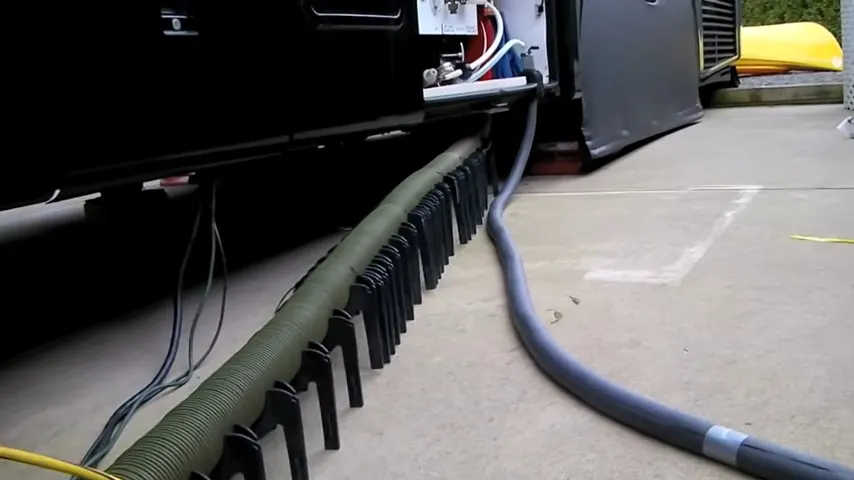
A bit of a downhill slope to your RV sewer hose is helpful for tank draining and to keep the hose from freezing. But it can also serve as a hill for mice to climb in an attempt to gain access to your RV! See our next tip to keep stowaway rodents away.
We’ve used our Slunky to provide an off-the-ground downhill flow for our sewer hose, which worked very well.
- RV SEWER HOSE SUPPORT: Elevated design supports your drainage hose and promotes better draining
- IMPROVED DESIGN: 26% wider and 30% deeper for increased stability and a smoother overall RV experience
If you’re camping in temps well below freezing, even using a Slunky to ensure the water flows out could leave you with your sewer hose slowly freezing up. In that situation, you’ll want to close your gray valve and allow your gray water to collect in your gray tank, only emptying it when necessary.
Or, if you’re the gadget type (no judgment here… we get it!), you could use a heated sewer hose support like this one:
- Efficient Winter Performance: Keep your RV sewage hose from freezing during cold winter temperatures with our innovative heated support bracket. It...
- Sturdy Three-Leg Design: Our support bracket features a durable three-leg tripod design, offering excellent stability and flexibility. Easily adjust...
Or even make your own using a similar technique to the heater freshwater hose!
But if you’re in a location where temps are only dipping below freezing overnight, and daytime temps are rising above freezing, you can leave your gray valve open, and the Slunky will keep your gray water flowing downhill.
Keep Rodents from Joining You for Your Winter RV Camping
Mice inevitably look for warm places to nest during the winter months, and they’re likely to be attracted to your warm, cozy RV.
One of our most successful tips for keeping mice from stowing away and becoming our guests has been to use steel wool to plug any areas of easy access into the RV.
For example, in the past, we found that we had mice entering through the water compartment. They’d use the sewer hose as a ladder to climb right up into the water compartment, and they could enter the RV from there. So we plugged the opening around the sewer hose with steel wool, and we also set a mousetrap inside that compartment just in case they were to get past the steel wool.
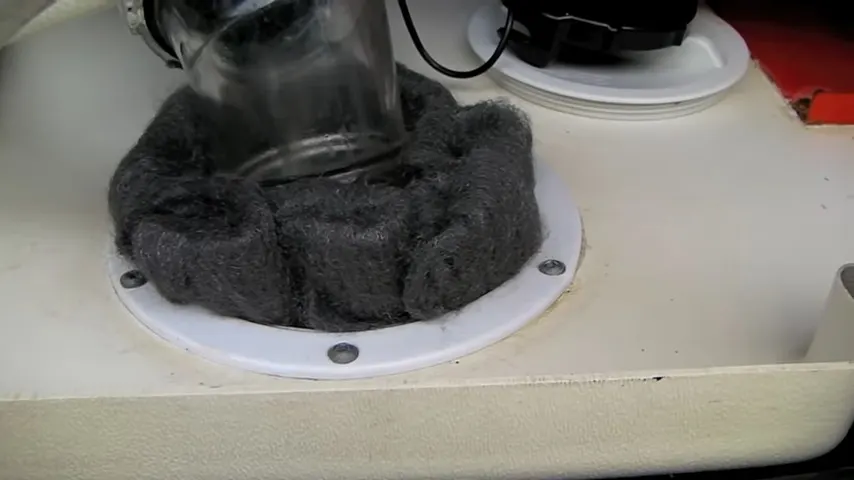
Because we found tell-tale mouse droppings inside our water compartment, we plugged the sewer hose outlet with superfine steel wool and set a single mousetrap in the bay as a backup. We haven’t had a mouse since.
This is the superfine steel wool we like to use for most RV projects that require it.
- Smooth shellac, lacquer or varnish before final top coat
- Buff furniture & woodwork - rubs out a high luster finish
If you prefer, brass wool is also an option as it serves the same purpose but doesn’t have the downside of rusting from moisture and humidity:
- POLISHES AND CLEANS stainless steel, brass, chrome, and more!
- REMOVES OXIDIZATION or strips paint where a softer touch is needed
How Do I Keep My RV Warm in the Winter?
Keeping your RV warm during the cold winter months is essential. Not only do you need to be comfortable for winter RV camping, but you need to make sure that your pipes, water pump, and other parts of your RV’s water system don’t freeze and cause severe damage, even if you’re away from your RV.
Here are a few tips for keeping your RV warm in the winter.
Add a Lightbulb to Your Water Compartment
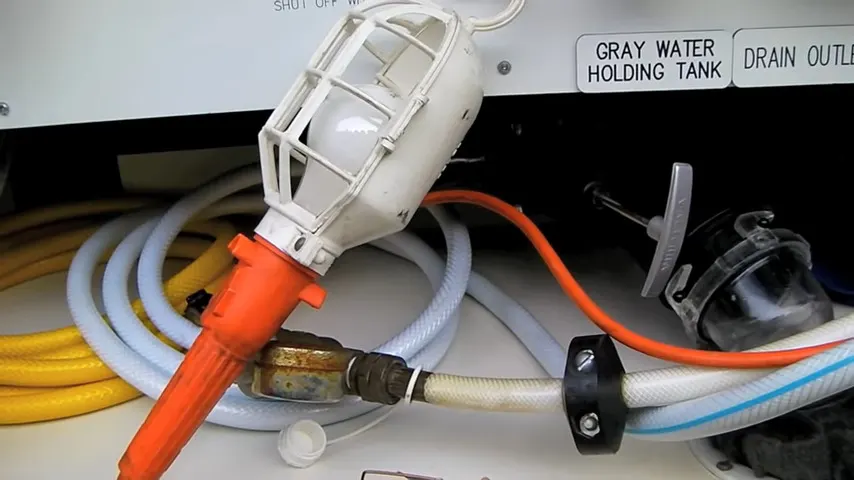
A 40 to 100-Watt lightbulb is helpful as a backup to keep the water pump, water lines, and other components in the water compartment safe from freezing temperatures.
When we spent time in cold winter weather, we added a 60-watt, incandescent lightbulb (inside a work light enclosure) to our water compartment as a backup heat source. Once in place, it made sure that our water compartment (including the water pipes and water pump) stayed above freezing. A lightbulb anywhere from 40 to 100 watts should be sufficient to keep the water compartment from freezing.
Note: incandescent bulbs are getting harder and harder to find as LEDs take over. But you WANT an incandescent bulb since they produce heat… which is the entire point of using them. Look for “rough service” bulbs that are designed for use in vibration-prone locations (like garage door openers), as they still tend to be available, even in big box stores.
Pro Tip: Use an indoor/outdoor thermometer to monitor the temperature inside your water compartment.
Simply place the sending unit inside the water compartment near your water pipes and water pump, and keep the monitor inside the RV where you can see it so that you can keep tabs on the temperature inside your water compartment from the comfort of your RV.
- Precise Timekeeping - Our wireless WS-9160UV3 thermometer indoor outdoor boasts 12/24-hour time displays for your convenience, allowing manual time...
- Multi-Format Calendar - The wireless temperature monitor helps you choose between day/month/date or month/date/year formats. It also has support for...
Turn on Your Basement Heater Blower Fan During Winter RV Camping
Not every RV has a basement heater, but if yours does, be sure to turn it on to ensure that whenever you’re using your RV’s furnace, warm air will blow into the basement and warm your water compartment.
Since you won’t always have your RV’s furnace running when you’re winter RV camping (like if you’re using a space heater), the light bulb trick above will be a constant backup source of heat.
Tap Into an External Propane Source
If you’re staying in one location for all or part of your winter RV camping and you have the opportunity to tap into a large external propane source, take advantage of it. This way you won’t have to move the RV every time you need to replenish your propane supply.
You can use an Extend-a-Stay kit to connect to an outside propane source.
- Includes propane tee.Fit Type: Universal Fit
- Includes 5' auxiliary tank hose and 12' additional appliance hose
For complete details, please see our recent post entitled How to Hook Up to an External Propane Connection.
Add Portable Heat Sources to Your RV’s Living Area
We have two heat pumps and a propane furnace to heat our RV. These are excellent heat sources, but all heat sources come with pros and cons. The problem with our onboard sources of heat is that the heat pumps use a significant amount of electricity, and the propane whole-house furnace uses a lot of propane.
So, we added a couple of small portable heat sources to our RV’s living area to keep us warm and toasty in our living and working space.
First is a small oscillating electric heater. It runs on about 8 amps on the highest setting, warms the room nicely. This one is very similar to the unit we have. We prefer non-digital space heaters because digital units have a tendency to reset to “Off” if there’s a power failure. This would mean that you’d have no heat and could have an issue with freezing. Analog dials/controls allow the heater to restart as soon as power is restored to the RV.
- WIDESPREAD OSCILLATION FUNCTION: This ceramic heater can rotate from side to side within 83 degrees, so it can fast and evenly warming the entire room...
- SAFE TO USE - The PTC electric heater made of cool touch ABS UL94 V0 flame resistant material. US standard socket can directly plug into an outlet...
The second portable heat source we’ve used is a small portable propane heater. The Kozy World portable propane heater we have is not available on Amazon at this time, though you might be able to find it elsewhere. Or take a look at the Camco Olympian Wave series of propane heaters, which are available in various sizes to accommodate the size of the space you’re heating. We have no direct experience with these heaters ourselves, but they are highly recommended by others.
We plumbed our portable propane heater to our external RV source by using a T-fitting to join the propane supply pipe to our stove, but we don’t recommend doing this yourself. If you’re going to plumb a line for a portable LP heater, seek the assistance of a professional.
IMPORTANT: Always open a window whenever you use any propane appliance for any length of time. This not only ensures sufficient oxygen in the space but also serves to allow some of the moisture to escape.
Use Holding Tank Heat Pads
When we bought our Newmar Mountain Aire 16 years ago, we really had no intention of ever camping in cold climates, but we ordered the holding tank heat pads just in case we might need them at some point, and we’re glad we did.
If you intend to do a lot of winter RV camping, holding tank heat pads might be a good idea. We’ve seen after-market heat pads for travel trailers and fifth wheels with accessible holding tanks, though we have no experience with any of them ourselves. But anyone who camps in extremely cold temperatures would do well to look into heat pads to keep your holding tanks from freezing. They use a minimal amount of power and ensure your tanks don’t freeze and, potentially, crack.
Use Warm Linens and a Bed Warmer on your Winter RV Camping Trip
Using flannel sheets and a down comforter as well as an additional blanket or two if necessary helps to keep you warm at night so you can turn the furnace down or off completely, depending on ambient temps (keep in mind that if you DO turn your furnace down very far, or off completely, you won’t have heat pumped into your basement and/or water bay, which could result in plumbing freezing… so be careful).
We have an electric mattress pad which we turn on before turning in for the night. Climbing into a warm bed really helps when you’re winter RV camping.
If you don’t have an electric mattress pad, heating your bed with an electric blanket for a while before you climb into bed is another way to make sure you’re starting the night warm and toasty.
How Do I Keep Moisture Out of My RV During Winter Camping?
With winter weather outside, you’re likely to keep your windows and doors closed tight. That means moisture produced by cooking, showering, and even breathing is going to accumulate inside your RV. And it’s not just condensing in the places you can see… that moisture is likely to form INSIDE your RV’s walls, which can lead to the buildup of mold and mildew that can cause serious health problems.
Keep Vents Open
As noted above, for safety reasons and to keep moisture from accumulating in your RV, you always want to crack a window open whenever you’re using propane for any purpose.
In addition, leaving roof vents open is a great way to reduce moisture inside the RV, since the warm air rising up out of the vent will carry humidity with it. Whether you have a single Fantastic Fan or two or more RV vents, open them slightly (as long as there isn’t a lot of snow on top of your RV!) and run your fans on low to help pull moisture out of the RV, and release it to the outside.
Squeegee Your Shower Walls
You probably didn’t see this one coming, but one of the best ways to reduce the buildup of moisture inside your RV is to squeegee the water on your shower walls immediately after you shower. Pulling all of that water down into the drain means there’s a lot less moisture to evaporate in the shower.
We’ve used this squeegee for quite some time. It hangs on the shower wall with the provided suction cup and is easily accessible for after-shower use.
- Wipes off tiles, mirrors, shower doors and windows
- Flexible blade works on rippled surfaces
If you see moisture accumulating on your windows, that’s a good heads up that you need to take further steps to reduce the moisture in your RV. As we mentioned above, if moisture is accumulating on your windows, it’s probably also forming inside your walls and could be contributing to mold and mildew formation. This is why keeping the RV as dry as possible is so important.
Use A Dehumidifier
If the methods noted above aren’t enough to sufficiently reduce moisture in your RV during winter RV camping, you can use a dehumidifier to dry out the space.
There are many dehumidifiers intended specifically for RVs on the market. On average, a small 30-pint dehumidifier is said to draw about 300 Watts of power, which is significantly less than a water heater, air conditioner, or hairdryer. But if you’re also using an electric space heater, make sure your dehumidifier won’t trip a circuit breaker, (especially if you’re using a larger capacity dehumidifier).
Conclusion
We hope these tips for winter RV camping might prove useful to you, should you venture into some cooler weather – or even some downright freezing temps. We’ll have more winter prep information coming your way as we bid goodbye to summer, enjoy the crisp, cool temperatures of fall, and move slowly but surely toward winter.
Do you have a favorite tip/trick for making your winter RV camping trips more comfortable? Please leave us a comment below!
Geek Out with Us Every Week
Join our newsletter to learn about all things RV-related. Every week we offer free tips, tricks, product reviews, and more to our online community of RVers. So, whether this is your first time on the road or you’re a seasoned expert, we’d love for you to geek out with us!



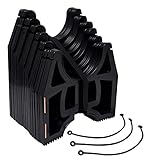








David Lee
Friday 8th of October 2021
Against my better judgment, we wintered in SW Missouri last year. I built my water hose as y’all suggested, but I did a lazy spiral with the heating cable. Not that I wanted to test the limits, but the coldest night was fifteen BELOW ZERO and we never lost our water. You certainly learn where the air leaks in your RV are at that temperature! ????
TheRVgeeks
Friday 8th of October 2021
Hi David. Glad to hear the DIY heated hose kept your water flowing in temps that cold! Now you know better than to winter in SW Missouri! ???????? LOL!